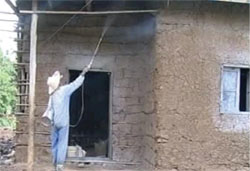Poisoning
A poison (also called a toxin) is a naturally occurring or manufactured substance which, if taken into the body in sufficient quantity, causes temporary or permanent damage. The common poisons that people may have in their homes include medical drugs, alcohol, household cleaning chemicals, kerosene and pesticides. You may be surprised when we say to you that medical drugs are 'poisons', but remember that medicines must be taken in the prescribed dosages and only by the person who has been prescribed that drug. All medical drugs are toxic if the dose is exceeded, or if they are taken by the wrong person – for example, the adult dose of a drug could seriously harm a child. In the Amharic language, this is expressed in the saying that 'even honey is sour if too much is taken'.
Can you think of some naturally occurring poisons?
You may have thought of poisonous plants, the bite or sting of poisonous animals (e.g. snakes, scorpions), and the toxins released by certain bacteria when they get into the body.
There are four different ways that a poison can get into the body. It can be:
- Ingested by swallowing, e.g. medicines, household chemicals, etc.
- Inhaled in the breath, e.g. when spraying houses or water collections with chemicals to kill insects or other vectors of communicable diseases (Figure 8.2); or inhaled carbon monoxide gas, which is an invisible poison found in the fumes formed by burning charcoal
- Injected, e.g. when bitten by a snake or injected by a needle
- Absorbed when the poison comes into contact with the skin and passes through it into the body, e.g. when a person is splashed with a chemical that kills insects (insecticide) or weed killer.

You should also know that the effects of poisoning are more serious when the person poisoned is very young, very old, or in poor health. This makes early diagnosis especially important in these groups.